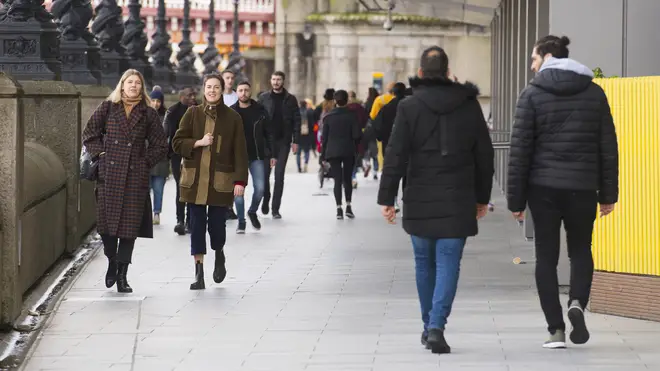
Ali Miraj 12pm - 3pm
17 February 2021, 11:01 | Updated: 17 February 2021, 13:00

A top scientist has told MPs the UK lockdown could be lifted more swiftly “because the data are so good” on vaccinations.
Speaking to the Science and Technology Committee on Wednesday, Professor Mark Woolhouse from the University of Edinburgh said: “If you’re driven by data and not the dates, right now you should be looking at early unlocking because the data are so good.”
Next week Prime Minister Boris Johnson is set to outline a roadmap for ending coronavirus restrictions, although he is reportedly unlikely to reveal a specific timetable beyond schools reopening on March 8.
READ MORE: Foreign Secretary Dominic Raab: No single 'cast iron formula' for lifting lockdown
READ MORE: Covid cases 'need to under 50,000' before lockdown is eased, health official warns
Prof Woodhouse, a professor of infectious disease epidemiology who sits on a sub-group advising SAGE, said: “We don’t want to be overly focused on dates, we want to be focused on data, but the point I'd make about that is the data are going really well.”
“The vaccination rollout is I think exceeding most people’s expectations”, he said, adding vaccination coverage of the most vulnerable groups is “key” and take-up is “turning out to be very high”.
He said the data also showed the "actual performance of the vaccine" was very promising.
“The transmission blocking potential is key, but so of course is its actual ability to protect against death and disease and to keep people out of hospital, and all those numbers are looking really good,” he said.

James O'Brien: 1.7m more shielding proves lockdown scepticism 'stupid'
However Professor Dame Angela McClean, a SAGE member and the chief scientific adviser at the Ministry of Defence, told MPs although “things are all moving in the right direction... we still stand at a high number of infections”.
She said over 20,000 people remain in hospital compared to 15,000 in early May last year, while roughly one per cent of people had the disease in the last week.
“I would say we need to be optimistic and cautious, there are still a lot of infected people out there,” she said.
Prof Woolhouse said last year’s March lockdown could have been eased earlier, citing schools and spending time outdoors as two areas that are particularly low risk.

Foreign Secretary: More money needed to provide vaccines for poorest
He said: “In terms of easing the first lockdown, one of the things we didn’t have then was as much confidence in the scientific data that we have now so in my view we were a little slow to learn from that scientific data.”
"I'll give you two examples... that schools were having a big contribution and that children were safe, I think there was a lot of uncertainty in the wider community and policy making circles about that back in April and May, but the evidence was there so I think we could have probably considered opening schools much sooner in the first lockdown.
“The other thing, quite clearly, is outdoor activities, again there was evidence going back to March and April that this virus does not transmit outdoors.”
However Dame Angela, of the University of Oxford, insisted "caution was our friend" when it came to easing the first lockdown, and that "things went very well".
She said she believed things were "very well managed" from May until September, but that in November the lockdown was lifted too early - however she said the new variant at that time was "very difficult to foresee".